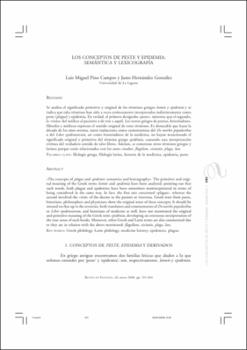Los conceptos de peste y epidemia: semántica y lexicografía
Fecha
2008Resumen
Se analiza el significado primitivo y original de los términos griegos loimós y epidemía y se
indica que tales términos han sido a veces erróneamente interpretados indistintamente como
peste (plague) y epidemia. En verdad, el primero designaba «peste», mientras que el segundo,
la «visita» del médico al paciente o de éste a aquél. Los textos griegos de poetas, historiadores,
filósofos y médicos expresan el sentido original de estos términos. Es destacable que hasta la
década de los años setenta, tanto traductores como comentaristas del De morbis popularibus
o del Liber epidemiarum, así como historiadores de la medicina, no hayan mencionado el
significado original y primitivo del término griego epidêmía, causando una interpretación
errónea del verdadero sentido de tales libros. Además, se comentan otros términos griegos y
latinos porque están relacionados con los antes citados: flagelum, visitatio, plaga, lues. The primitive and original
meaning of the Greek terms loimós and epidemía have been analyzed, pointing out that
such words, both plague and epidemics have been sometimes misinterpretated in terms of
being considered in the same way. In fact, the first one concerned «plague», whereas the
second involved the «visit» of the doctor to the patient or viceversa. Greek texts from poets,
historians, philosophers and physicians show the original sense of these concepts. It should be
stressed on that up to the seventies, both translators and commentators of De morbis popularibus
or Liber epidemiarum, and historians of medicine as well, have not mentioned the original
and primitive meaning of the Greek term epidêmía, developing an erroneous interpretation of
the true sense of such books. Moreover, other Greek and Latin terms are also commented due
to they are in relation with the above mentioned: flagellum, visitatio, plaga, lues.






